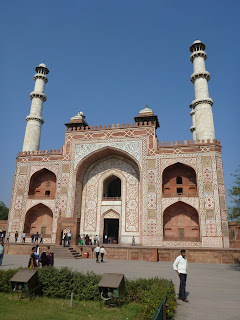 Sonu stops twice on the way to Agra. The first is at a
strange marble temple/mosque/church where a succession of holy men have managed
to gain a cult following. The tenants of this sect seem more or less harmless,
they believe in vegetarianism, peace, and prayer. The building itself was a
spectacle of white marble that hurt to look at directly without sunglasses.
While I checked out the place, Sonu took a nap in the car. He had taken the ten
minutes before we got there to explain what the place was all about and how I
should behave inside, but he didn’t want me to pay admission for him, and
bottom lining it, he was my driver, not my guide.
Sonu stops twice on the way to Agra. The first is at a
strange marble temple/mosque/church where a succession of holy men have managed
to gain a cult following. The tenants of this sect seem more or less harmless,
they believe in vegetarianism, peace, and prayer. The building itself was a
spectacle of white marble that hurt to look at directly without sunglasses.
While I checked out the place, Sonu took a nap in the car. He had taken the ten
minutes before we got there to explain what the place was all about and how I
should behave inside, but he didn’t want me to pay admission for him, and
bottom lining it, he was my driver, not my guide.
Our next stop was the Tomb of Akbar. Akbar was a Mughal Emperor from when the Muslim caliphates ruled India. His full historical title is "Akbar the Great" and it is well earned. Akbar expanded the Mughal Empire, built many marvels and left such a lasting impression of tolerance and respect on India that Hindus and Muslims speak highly of him unto this day. He is remembered as a cunning warrior, a skilled artisan and a fair and honest leader.
His grave complex is beautiful, and sprawls across several
acres along the edge Agra/Delhi highway. It is a square four quadrant garden
with raised causeways leading to the four entrances that exist at the center
points of all four walls. At the center is a magnificent palace of Islamic
architecture, all strange floral designs and mosaics. The entrance to his tomb
is a long, unadorned marble hallway that leads down into darkness.
 The crypt is a high walled and utterly empty room, adorned
only with a simple sarcophagus. A single ray of light shafts down the entrance
corridor, giving a flat, diffuse light. The acoustics in the room make every
whisper a shout, every scrape of fabric a strange rasping noise that fills the
empty corners of the massive room with the strangely small grave.
The crypt is a high walled and utterly empty room, adorned
only with a simple sarcophagus. A single ray of light shafts down the entrance
corridor, giving a flat, diffuse light. The acoustics in the room make every
whisper a shout, every scrape of fabric a strange rasping noise that fills the
empty corners of the massive room with the strangely small grave.
Tourists of all types crowd in. A shockingly loud school
group piles in, disturbing my quiet contemplation of the great man’s tomb. I
watch a large group of what I guessed to be Saudis, men in nice dress clothes,
women in full black, only their faces exposed, check out the compound. With a
studiously blank expression I watched the women wait outside in the corridor
while the men entered the actual crypt.
 For me, the tomb was an empty room with a small grave for a
man. Not my king, not my emperor, not a divinely inspired leader, not even from
the same culture. Yet still I felt I could relate to this man. Akbar was, above
all other things, a warrior. He fought for ideas and what he believed was
right. It made him a king, first among his people. But at the root of it, he
fought for an idea of how the world should be, as I do.
For me, the tomb was an empty room with a small grave for a
man. Not my king, not my emperor, not a divinely inspired leader, not even from
the same culture. Yet still I felt I could relate to this man. Akbar was, above
all other things, a warrior. He fought for ideas and what he believed was
right. It made him a king, first among his people. But at the root of it, he
fought for an idea of how the world should be, as I do.
Our views of how the world should be are almost certainly
different. But in that dark, echoing room, I found myself wondering what Akbar
would have thought of those men and women, and of me, silently watching.


Dude, where's you shoes?? :-)
ReplyDelete